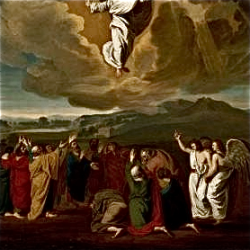Easter is over, and many of us (especially those of us in the Free Church tradition) won’t celebrate another holiday marking a biblical event until Christmas. But this year we should not overlook Ascension Day, or Holy Thursday, which is celebrated 40 days after Easter and commemorates the day Jesus was taken up to heaven following His resurrection. This year it falls on May 9 for the Western Church. The ascension has been marked by a Christian holiday since at least the fourth century and is still an important day on the liturgical calendar for Roman Catholics, Anglicans, and Orthodox Christians.
 Though both the cross and the resurrection are more prominent in Scripture, the ascension is recounted in two of the four Gospels and Acts. And the Epistles are sprinkled with references to it, as when Paul says Jesus was “taken up in glory” (1 Timothy 3:16) and when Peter says Jesus “has gone into heaven and is at the right hand of God” (1 Peter 3:22). Since Scripture has so much to say about the ascension, we should pause to note why it’s important.
Though both the cross and the resurrection are more prominent in Scripture, the ascension is recounted in two of the four Gospels and Acts. And the Epistles are sprinkled with references to it, as when Paul says Jesus was “taken up in glory” (1 Timothy 3:16) and when Peter says Jesus “has gone into heaven and is at the right hand of God” (1 Peter 3:22). Since Scripture has so much to say about the ascension, we should pause to note why it’s important.
First, the ascension was an essential part of Christ’s work as the great high priest. In the Old Testament, Israel’s high priest would sacrifice an animal on the Day of Atonement on behalf of the people. Then he would carry the blood into the holy of holies and sprinkle it on the mercy seat. Only then did God accept the sacrifice and cover the sins of His people. According to Hebrews, what the high priest did in the earthly Temple, the great high priest did in the heavenly temple. At the ascension, Christ presented to the Father the blood of His sacrifice on the cross “to put away sin” (Hebrews 9:26). Though Jesus’ payment for sin was completed on the cross, His priestly work reached its culmination when He ascended.
Second, the ascension inaugurated Christ’s supreme rule over the universe and the Church. As the second person of the Trinity, Jesus was always omnipotent. But when He came to earth in human form, He laid aside some of His divine privilege and became a suffering servant (Philippians 2:6-8). When He ascended, the Father gave back to Him the authority to govern all of creation from His heavenly throne, especially the Church. At the ascension, the Father “seated [Christ] at his right hand in the heavenly places, far above all rule and authority and power and dominion” (Ephesians 1:20-21).
On a related note, at the ascension Christ received authority to pour out the Holy Spirit on the Church, empowering it for righteous living and gospel witness. Jesus predicted this when He told His disciples, “It is to your advantage that I go away, for if I do not go away, the Helper will not come to you. But if I go, I will send him to you” (John 16:7). At Pentecost Peter announced the fulfillment of that promise: “Being therefore exalted at the right hand of God, and having received from the Father the promise of the Holy Spirit, he [Jesus] has poured out this that you yourselves are seeing and hearing” (Acts 2:33).
Finally, because believers are united with Christ, His ascension allows us to share in a measure of His authority. Since God regards us as “seated . . . with him in the heavenly places in Christ Jesus” (Ephesians 2:6), we enjoy the authority to prevail against sin, Satan, and death. If you’ve never celebrated Ascension Day, all this is cause to consider adding another Christian holiday to your calendar this year.
<!-- RefTagger from Logos. Visit http://www.logos.com/reftagger. This code should appear directly before the tag. -->
//
//
1 thought on “Why Should We Celebrate Ascension?”
Comments are closed.
Thank you for speaking in favor of celebrating Ascension Day! A few of us do at the Episcopal Church of the Resurrection, in Franklin, Tennessee, and this is one celebration that is its own reward.
Father Joe Davis
resurrection-tn.org